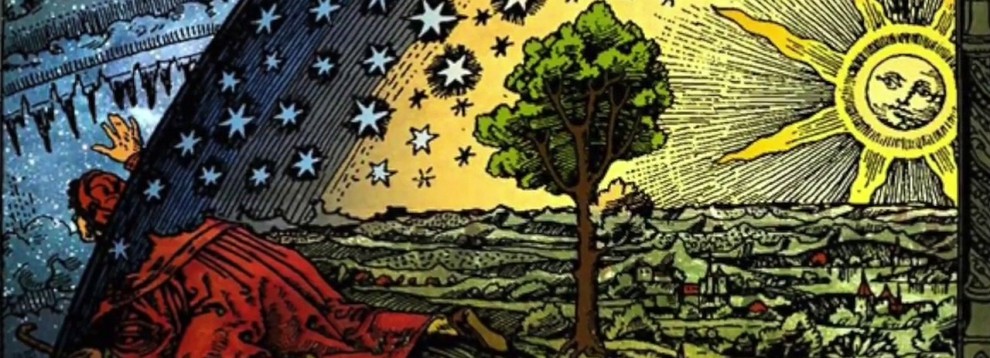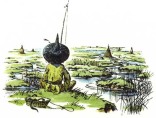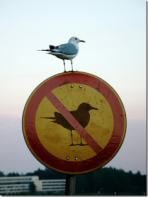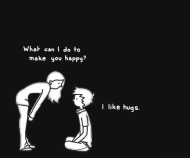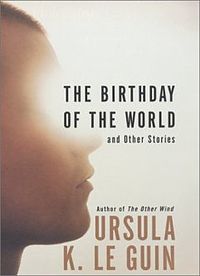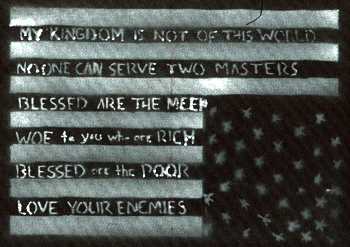Like I said in my last post I’ve been rereading Thea Beckmans Thule trilogy recently. There are several interesting ideas in the books that are worth blogging about, which is problematic since they are only available in Dutch. So in this post I will try to summarise the most important details of the intriguing worldbuilding of the trilogy as a reference for further posts in this series.
In a way the books are built around a simple post-apocalyptic reboot of humanity, in which some cultures have learnt from ‘the Great Catastrophe’ (nuclear world warIII), and others haven’t a thousand years later: The Thulenes have a nonviolent culture based on respect for life and the leadership of women, while their opponents the Badeners are a dystopian mix of the negative aspects of European cultures of the last few centuries that isn’t actually that unrealistic.
The land of Thule
The land of Thule is a temperate-climate Greenland in a world where the North pole has moved to Japan and the South pole to South America. It is inhabited by people of mixed race, mostly descendants of Danish colonists and Inuit from before the Great Catastrophe. The capital is Gothab. The language is Thulene, which isn’t used in the books, but is the place and person names are a good indication that it falls something in between Inuit languages and Scandinavian too. People on the coast often known some Kanadene as a second language, descended from English and still mutually intelligible with the languages of the Merikans and Brits.
Thule: General culture:
Thule has a simple and rather low-tech culture, depending on horses and windmills. No-one is poor and no-one except for the royal Konega-family is rich. Communities share most of their stuff: houses, boats and horses belong to the whole community, but people do have personal property too. They also use silver money, but part of the wages is paid in various stuff. Children in school don’t just learn theory but also how to build houses and other practical stuff, and most people make furniture themselves.
He (Kilian) would have to search for a job, because his academic degrees were worthless here in this country. Thulenes had a completely different education than children in the Badener Empire. Here they were taught carpentry, sailing, cooking, shipbuilding, and all kinds of practical matters. And what were his skills? Nothing like that… (THP p.262)
Frederiksborg is an important university city. 80% of the university population is female, since men are rather rare in higher jobs. Thulenes have printing presses and colour print. Gunpowder is known but normally only used for fireworks or mining. Fire-arms are unknown orand later considered taboo. The only weapon used is a kind of stun-gun with little poisoned arrows, or the thorns of which the poison comes, that make an animal or human fall unconscious for a while. Men with weapons are seen as extremely indecent, except in the case of woodsmen. The idea of men fighting is shameful, almost obscene.
Important areas are the Capital Gothab on the West coast, the Holtak-district where the vases vases with gold-dust are made in the middle, and Kulus in the East. The Mining districts are in the North, where winters are still cold. Gold is exported to Kanada for wheat, and most trade with other countries is barter.
The population runs in the millions, but no-one has ever counted how much Thulenes there are, since people are not registered. They only have first names, except for the women descending from the ‘Mother of the Motherland’ Sigrid Helgadottir who are called ‘Dottir’ and are considered some kind of nobility. Most of the dottirs seem to be connected to trade.
Thule: Nature
Thulenes live very close to nature, and feel like themselves are a part of nature. Destruction of nature is punishable. Hunting is generally forbidden, and for every tree that is cut down a new sapling must be planted. Killing an animal is seen as murder almost as much as killing a human. The Thulenes import wild animals from Kanada for the balance of nature, and have a very diverse wildlife with deer, 4 species of bears (it’s implied that ice bears have survived too in the North, and adapted to a more temperate climate), wolves, foxes, moose, and much more. The people are friendly to animals, even predators and are in return rarely attacked by them and often treated as friends by animals.
I don’t understand, Kilian thought. This wilderness is full of devouring beasts, but this morning a wolf only woke me up and then ran away from me. And I seem to have slept in the arms of a bear, which didn’t do me any harm either. Shouldn’t people feer them at all?
No, he answered his own question. Not if the bear thought you were a Thulene. (THP p. 226)
Marine mammals are also friends of the Thulenes, and orcas even know the difference between the Thulene language of friendly humans and the Badener language of enemies who want to kill them. Elvira knows to ward off an orca that wants to attack the lifeboat after her ship has sunk by talking to it in Thulene, although it tries to attack people speaking Badeners.
Meat is eaten though, but only from old animals that have lived a happy life, which makes all meat extremely chewy. Birds are never eaten or killed. Eating fish is less of a taboo than eating meat, but in the dolphin season fish is left for dolphins and humans and not fished by people.
Poaching and destruction of nature get punished harshly with a mark in the face. (see later)
Thule: Gender roles
Thule is clearly a matriarchy: women are leaders in every aspect of society, they held most jobs with power, and they are seen as the more responsible sex. Men are seen as not to be trusted with power, which is connected to the stories about the Great Catastrophe, when the world was almost destroyed by men. Apart from that the society of Thule is not only very friendly but also egalitarian. There are hardly any class distinctions and people of all classes mingle with each other.
Men were nice, strong, often friendly creatures that could do the heavy work, that could plough the land, cut down trees, carry heavy loads and build houses, but couldn’t be trusted with something as sensitive as governing a country. They were too rude for that, too headstrong and selfish… Am I rude and selfish? Christian wondered. Was my father Rajo? (KOMA p.20)
This is also reflected in the political system: Thule is ruled by the Konega with the Council of Women, which consists of all district leaders and sometimes family members of the Konega, but traditionally no men. A small reform at the end of the first book tried to balance the inequality between the sexes by giving the men in the Konega-family a place in the Council of women too. In the third book, 50 years later that means 3 men and 26 women. Other cultures close to Thule like the Kanadenes and the Baffinlanders seem to also be female-led by the way.
Thule: Relationships and Marriage
monogamous marriage based on love seems to be the norm, but with reversal of traditional gender patterns: Christian at the beginning of the first book for example is horrified by the idea that he, as a Konega-son, might have to ask a woman himself instead of her asking him. Apart from that it seems that relationships are both rather relaxed and serious at the same time and based on friendship and intimacy.
Intercultural relationships and marriages, even with Badeners, are not seen as a problem at all if the character of the outsider has proven to be good.
Nanora had told her friends of the weaver mill enthusiastically about the young sailor who was so nice, had such a sweet face, cared so much about his mother and behaved so well. It wasn’t true at all that all of the Badeners were fiddling around with your body, that they were intrusive and brutal and thought that all girls just had to do whatever they liked. Erich was completely different: modest and careful. He left the initiative to his girlfriend, as it should be, and waited quietly until it was time for more intimate caresses. Really, Badeners were okay if you got to know them. (THP p 307)
Women get only a few children, because they have more things to do with their life than being a mother. (I suppose contraception is implied but not named because it is a childrens’ book after all. Nothing is said about sex explicitly.) Girls are sometimes valued above boys, although in theory boys are loved equally. People are very relaxed about nudity and young people are very playful and relaxed about their bodies in general. (Compared to the prudish Badeners) Prostitution is unknown, and harassment of women or violence within a relationship is a strong taboo.
The one exception to people being free to choose their own partner is the succession law for the Konega-family: a Konega-son can traditionally only marry a woman from the ‘dottir’ families, because of the supposed genetic superiority of the family line of Sigrid Helgadottir. This rather eugenic practice is called out as such by Christian, as he struggles with his love for the non-dottir girl Thura, and this law also gets a reform at the end of the first book for Christian and Thura.
Thule: Religion
Thulenes have a rather non-religious reverence for mother Earth, which is mostly just seen as the planet herself. They are not offended when Badeners describe it like that either. There are no priests or religious services, only small open temples in which people can sit in silence. These temples typically have a place on which one or more vases (if possible Holtak-vases made with gold-clay) with flowers are put express thankfulness.
Thule: Political system
Thulenes have a monarchy led by a Konega. The first Konega was Sigrid Helga-dottir, who came from Yselan (Iceland), and the Icelandic matronym ‘dottir’ became a kind of clan name for her female descendants, which were seen as women of great intelligence and intuition. Only a dottir can be a Konega. Thura becomes the first non-dottir Konega-mother, and her daughter Ferika-dottir then became the successor of Christians mother Armina-dottir.
The Council of Women consists of the leaders of all districts of Thule, and is in Gothab with the Konega half of the year and in their own district the rest of the year. District leaders, as well as region and city leaders are chosen democratically by men and women, based on their competence and skills, and always female.
Thule: Punishment system
The last intriguing part of Thulene society is their unique system of punishment. Thulenes never use violence (their worst weapon is a stun gun) and they don’t take away someone’ Continue reading
